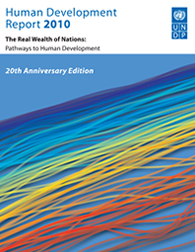The Report, titled "The Real Wealth of Nations: Pathways to Human Development," stresses that economic insecurity and climate change are major sources of vulnerability and unsustainability of development.
 4 November 2010: The UN Development Programme (UNDP) has released the 20th anniversary edition of its annual flagship publication, the Human Development Report (HDR). The report is titled, “The Real Wealth of Nations: Pathways to Human Development.”
4 November 2010: The UN Development Programme (UNDP) has released the 20th anniversary edition of its annual flagship publication, the Human Development Report (HDR). The report is titled, “The Real Wealth of Nations: Pathways to Human Development.”
The report was launched by UN Secretary-General Ban Ki-moon with UNDP Administrator Helen Clark and Nobel laureate Amartya Sen. It focuses on long-term development trends and indicates that, although inequalities within and between countries remain, people today are generally healthier, wealthier and better educated than they were in 1970. It indicates that major challenges to development, including climate change, need to be addressed by a global governance system and not by individual States. The HDR includes a development agenda post-2010 that focuses on the progress and threat of climate change, including an agenda for research and policy.
The report stresses that economic insecurity and climate change are major sources of vulnerability and unsustainability of development, in particular from unsustainable production and consumption patterns that rely heavily on fossil fuels. It emphasizes that climate change may be the single factor that makes the future very different, impeding continuing progress in human development. The report also recognizes the greater risks of climate change to island countries, in some cases threatening their existence.
The HDR recommends that development strategies incorporate low-carbon patterns of economic activity and increase resilience to climate-related shocks. It further underlines that challenges such as water scarcity, land degradation, and the widespread loss of biological diversity and ecological services can harm growth and broader progress in human development.
The 2010 HDR recalls that the report issued in 2007/2008 applied a human development lens to highlight the costs of climate change, including cross-generational poverty traps caused by climate shocks and the phenomenon of “adaptation apartheid.” It notes increased awareness of the impact of climate change on human well-being globally since the publication of that report.
The report provides data for 169 countries, including small island developing States (SIDS). Norway is ranked at the first position with very high human development, while Zimbabwe is listed last with low human development. Noting that, for many countries, long-term development gains are not directly linked to national economic growth, the report assesses human development on the basis of health, education and income indicators, as an alternative to macroeconomic assessments of national progress. [UNDP Human Development Report 2010] [UNDP Press Release] [UN Secretary-General’s Statement on the Launch of the HDR] [UN Press Release]